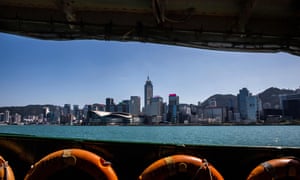
After weeks of sustained calls for Hong Kong to relax its quarantine and border restrictions, the city’s leader has just announced they’re getting tougher.
Currently Hong Kong’s border rules are a labyrinthine range of entry requirements depending on the traveller’s point of origin, vaccination status, visa status, and quarantine hotel bookings.
The city mostly bans non-residents, and requires entrants to undergo up to 21 days of quarantine. There are some exemptions to that, which include allowing some resident travellers to undergo shorter periods of quarantine or for other individuals like diplomats and business figures – recently including Nicole Kidman who was filming a movie – to bypass it altogether or to isolate at home.
At a regular press conference on Tuesday, Lam announced “most” quarantine exemptions to visitors coming from both overseas and the mainland will soon be cancelled. She said only essential workers, like truck drivers carrying goods between Hong Kong and China, would be allowed to travel without quarantining.
Hong Kong has gone about two months without a domestic case of Covid-19 but its leader, Carrie Lam, has made it clear she is prioritising reopening travel with mainland China over lifting international border restrictions. China is pursuing a zero Covid strategy, and expects Hong Kong to have similar situation and response measures in place in order to ease cross-border travel.
Lam conceded this posed a “dilemma”, but a mainland bubble remained the priority.
“So if Hong Kong were to loosen border controls for people arriving from overseas or adopt what other countries have done – so-called [living] with the Covid-19 virus – then the chances to travel with the mainland will be reduced.”
The decision walks Hong Kong even further away from what international business groups, companies and expats, as well as residents with overseas family ties had been lobbying for.
Faced with the uncertainty of the border closures on top of a worsening security and political environment, foreign chambers of commerce have warned many existing companies are leaving, downsizing or moving staff to other Asian cities.
“What we do not see is a massive outflow of companies out of Hong Kong,” Frederik Gollob, the chairman of the European Chamber, recently told Bloomberg. “But we do see the tendency to restructure either functions, parts of your teams, teams, or in some cases, entire companies to other locations in Asia.”
A survey by the US chamber of commerce earlier this year found more than 40% of its members were considering leaving Hong Kong, but its president, Tara Joseph, said the government was not responding to their concerns. “We’re at the point where it just feels like we’re talking to a wall,” Joseph told Bloomberg. “So we’ve stopped writing letters at this point.”



